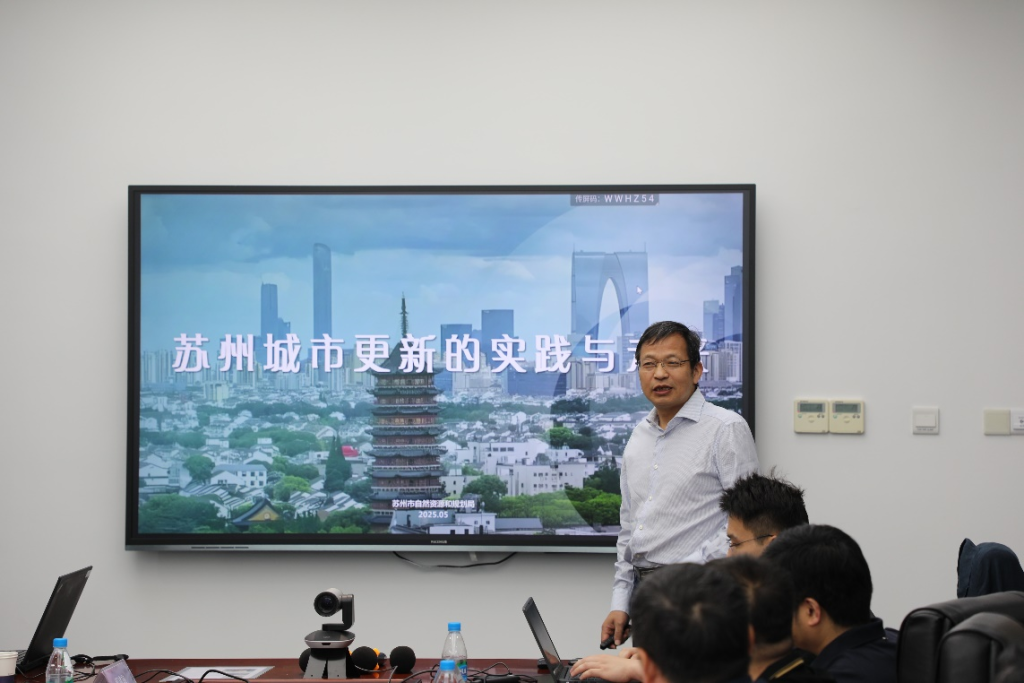30 May 2025
On May 24, the quadripartite dialogue on urban regeneration in the post-expansion era, jointly organized by the Design School of Xi’an Jiaotong-Liverpool University (XJTLU) and the School of Architecture and Civil Engineering of Xiamen University, was successfully held at XJTLU. This dialogue was a significant academic and practical exchange initiated by the two universities in collaboration with local government authorities, planning, and construction industries, following the Guidelines on Advancing Urban Regeneration Actions jointly issued by the General Office of the CPC Central Committee and the State Council on May 15.
The event brought together 18 participants, including senior officials from Suzhou’s urban planning and housing departments, senior practitioners in urban planning and property development, and researchers, to discuss the concerns, challenges, and potential pathways for institutional and policy innovation in urban regeneration under current conditions. Over 50 attendees, including faculty and students from XJTLU, professionals from Suzhou, and neighboring cities, participated in the dialogue.

The event was divided into keynote speeches and thematic discussions. The keynote session featured insights from academia, policy, and practitioner, and were delivered by: Professor Zhao Yanjing, Vice President of the Urban Planning Society of China, member of the Science and Technology Committee of the Ministry of Natural Resources, and dual-appointed professor in urban planning and economics at Xiamen University, who analyzed the institutional barriers in transitioning from urban expansion to stock regeneration.
He highlighted that existing systems, designed for expansion, hinder public and private sector participation. Under expansion models, governments profit from land value appreciation via increased floor-area ratios (FAR), but without property taxes, massive assets fail to generate sustainable cash flow. Thus, stock regeneration requires a paradigm shift in governance to incentivise resident-led renewal.

Mr Xu Keming, Deputy Director of Suzhou’s Bureau of Natural Resources and Planning, shared Suzhou’s pioneering practices as a national pilot city for urban regeneration. He emphasized the central government’s strong commitment, citing the recent Guidelines that outline eight key tasks and six implementation safeguards. Suzhou has established a dedicated urban regeneration task force and introduced policies like the Suzhou Urban Regeneration Regulations, leveraging fiscal incentives, flexible FAR policies, and diversified financing to support community-led renewal, adaptive reuse of underutilized land, and historic preservation. Mr. Xu also presented case studies on balancing redevelopment, cultural heritage, and stakeholder coordination, envisioning a future of "Gusu’s Prosperity" through institutional innovation, smart technologies, and equitable value distribution.

Mr Gu Jun, Chairman and CEO of Jiangsu Lanyuan Cultural Industry Co., Ltd., shared the company’s experience in executing over 90 regeneration projects across 20+ cities. As a private firm specializing in regeneration, Lanyuan adopts a full-lifecycle approach—from planning and financing to operation—emphasizing cultural preservation and adaptive reuse to attract social capital. Their philosophy of "retaining traces, quality, and vitality" shifts the focus from property rights to human-centric regeneration.

The thematic discussion delved into land-use adjustments, FAR policies, transitioning from development to operation models, property owner-led renewal, financing, urban village regeneration, and reforms in urban planning education. Participants agreed that the shift from expansion to stock regeneration demands overcoming entrenched mindsets and institutional constraints. Financially, regeneration must achieve lifecycle economic balance. For urban planning education, cultivating interdisciplinary talents versed in planning, economics, and social dynamics is now urgent.

The meeting commenced with a brief introduction of the preparation process of the event and the attending guests by Dr Xuefeng Wang. Dr Wang also expressed a heartfelt gratitude to the participants. Professor Shaosen Wang, Dean of the School of Architecture and Civil Engineering at Xiamen University, delivered the opening welcome speech and chaired the keynote presentations. Dr. Xuefeng Wang facilitated the thematic dialogue session. The event concluded with closing remarks by Professor Marc Aurel Schnabel, Dean of the Design School at Xi'an Jiaotong-Liverpool University. This event received full support from the XJTLU Design School and the Department of Urban Planning and Design.

Professor Shaosen Wang

Professor Marc Aurel Schnabel

Dr Xuefeng Wang
Story provided by Dr Xuefeng Wang
Edited by Yi Qian
30 May 2025








